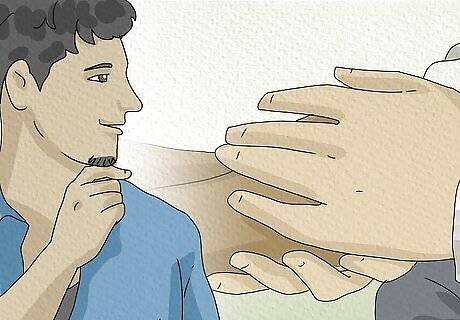
views
- Narcissistic compassion is when a person acts like they’re caring or empathetic in order to feel superior to others.
- Narcissists may fake compassion to manipulate others, preserve a positive self-image, or play the victim if they’re called out for their behavior.
- Show compassion toward a narcissist if they recognize how their behaviors have hurt others and want to change. If they act the same, keep enforcing boundaries.
What is narcissistic compassion?

Narcissistic compassion is when someone cares for others just to make themselves look better. A compassionate narcissist primarily cares about their own needs and how they can make themselves stand out. Empathy isn’t typically a genuine response from a narcissist, and they’ll only act that way if they see there are benefits to gain. Example: A narcissistic partner may show public displays of affection around other people while they continually criticize you in private.
Can narcissists have compassion?

Narcissists typically fake compassion for their own personal gain. Narcissists believe they’re the most important person in the world, so they’ll take any opportunity that makes them look like a good person. They may help out or act attentive to someone’s needs, but it’s only because they want to look their best when other people are watching them. Example: A narcissistic coworker may reach out to help on a project you’re struggling with just so they can also get some credit.

Narcissists may feel empathy but refuse to express it. Studies have shown that some narcissists can recognize feelings in other people, but they’re afraid to be vulnerable and fully step into different perspectives. Narcissists want to be in control, but acting compassionate and exposing their feelings makes them uncomfortable. More often, they’ll just act cold or distant rather than empathizing. If a narcissist really trusts you, they may feel more emotionally safe and state their true feelings.
How do narcissists use compassion?

To manipulate you and get what they want If a narcissist acts compassionate toward you out of the blue, they may be trying to sway your decisions. They could be future-faking by making false promises to coerce you into acting a certain way, or they may be acting nice to gain your trust so you have their back if things go wrong. They may also be trying to get information out of you that they can later use in personal attacks against you if you ever try to expose their actual behavior. Example: A narcissistic parent may act loving and say they’ll spend time with you if you do chores, but then they will ignore you after you complete them.

To preserve their image Narcissists care the most about how other people view them, so they want to feel a step ahead of others. Narcissists may pretend like they’re empathetic or compassionate to your needs when they think someone is watching so they seem like a good person. If no one is there to see how the narcissist reacts, then they won’t be as empathetic. Example: A boss who’s a compassionate narcissist may treat you poorly when you have a one-on-one, but show more support and understanding around their superiors.

To maintain control over you Narcissists are aware when you’re feeling down, so they may act compassionate so you feel better. In reality, they may have insecure narcissism and worry about you leaving. They’ll continue treating you with false compassion while you’re doing things they like, but they’ll punish you if you ever act or speak out against their behavior. The narcissist hopes that you’ll eventually be afraid to speak up or leave, giving them full control. Example: A narcissistic partner will tell you they’ll continue loving you if you act a certain way but will leave if you keep up undesirable behaviors.

To play the victim when they’re called out If a narcissist acts compassionately towards you around others, people only see the persona they're putting on. If you call the narcissist out on any of their bad behaviors, they'll act like you're causing an issue and they've been compassionate the whole time. Because other people have only seen their false empathy, they might side with the narcissist instead of you. Example: A narcissistic bully may pick on you privately but act more jokey in front of others. If you lash out at the bully, they’ll act like they didn’t do anything wrong and say you’re causing the problem.
Should you show compassion to a narcissist?

Act compassionately to narcissists who recognize they should change. While many narcissists continue following the same patterns, it’s still possible for them to change their behavior, especially if they see a therapist. If they sincerely acknowledge and understand how their behavior affects others, help the narcissist by empathizing with them. By showing compassion for them, they can learn how to express it on their own.

Stay guarded and enforce boundaries if they continue their behavior. If you see a narcissist still acting on their own interests or manipulating other people, then they may try using your compassion against you. Even though it may seem like you’re helping them, they may have ulterior motives instead. Establish clear boundaries with how you interact with a narcissist, like how much you open up to them or how often you spend time together. Follow through with your boundaries to protect yourself from any narcissistic outbursts they have.




















Comments
0 comment